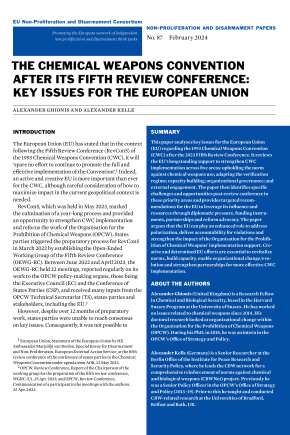The Chemical Weapons Convention After its Fifth Review Conference: Key Issues for the European Union
This paper analyses key issues for the European Union (EU) regarding the 1993 Chemical Weapons Convention (CWC) after the 2023 Fifth Review Conference. It reviews the EU’s longstanding support to strengthen CWC implementation across five areas: upholding the norm against chemical weapons use; adapting the verification regime; capacity building; organizational governance; and external engagement. The paper then identifies specific challenges and opportunities post-review conference in these priority areas and provides targeted recommendations for the EU to leverage its influence and resources through diplomatic pressure, funding instruments, partnerships and reform advocacy. The paper argues that the EU can play an enhanced role to address polarization, deliver accountability for violations and strengthen the impact of the Organisation for the Prohibition of Chemical Weapons’ implementation support. Creative and determined EU efforts are essential to revitalize norms, build capacity, enable organizational change/evolution and strengthen partnerships for more effective CWC implementation.
I. Key areas of EU support for the OPCW and CWC implementation
II. The CWC after its Fifth Review Conference: Charting the path ahead
III. Conclusions and recommendations

